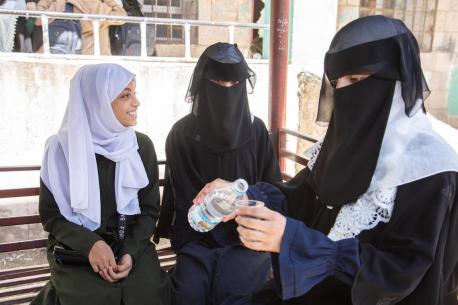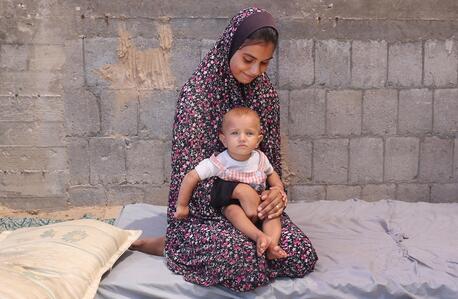
Solar-Powered Water Systems Keep Children Learning in Yemen
Large-scale sustainable water systems installed by UNICEF and partners provide access to safe water for families, schools and health centers in Yemen.
Eight years of conflict and a deteriorating economy in Yemen have devastated both the country's people and the basic services they rely on. Fuel prices have skyrocketed, leaving diesel-powered water pumps too costly to operate. Growing water scarcity has been exacerbated by climate change.
Children without access to safe water, sanitation and hygiene (WASH) are more vulnerable to malnutrition, cholera and death from common infections.
"The war has had a dire impact on our physical and mental health," says Jamila, a 17-year-old student at Al-Zahra'a School in Dhamar Governorate. "It has caused division in our society and systematically destroyed the education system."
How does access to safe water affect a child's education? Watch the video to find out.
More than 150 solar fields are up and running, benefitting 2.5 million people
Schools need safe water and working toilets to keep their students healthy. Many learners are forced to skip school or drop out altogether to fetch their family's household water supply.
To improve water access in Yemen, UNICEF and partners are installing sustainable, solar-powered water systems across the country. More than 150 solar fields are already up and running, benefitting 2.5 million people.
The now-solarized Sama well field has secured clean water for 137,000 people in Dhamar, including the students and teachers at Jamila's school.
"Water in my school was nonexistent," she says, "but after UNICEF started this water aid project, and provided water tanks and solar energy systems, it has affected us positively as students, and we are all happy."
UNICEF is working around the clock to protect Yemen's children and help them reach their full potential. Your contribution can make a difference. Please donate.
HOW TO HELP
There are many ways to make a difference
War, famine, poverty, natural disasters — threats to the world's children keep coming. But UNICEF won't stop working to keep children healthy and safe.
UNICEF works in over 190 countries and territories — more places than any other children's organization. UNICEF has the world's largest humanitarian warehouse and, when disaster strikes, can get supplies almost anywhere within 72 hours. Constantly innovating, always advocating for a better world for children, UNICEF works to ensure that every child can grow up healthy, educated, protected and respected.
Would you like to help give all children the opportunity to reach their full potential? There are many ways to get involved.





